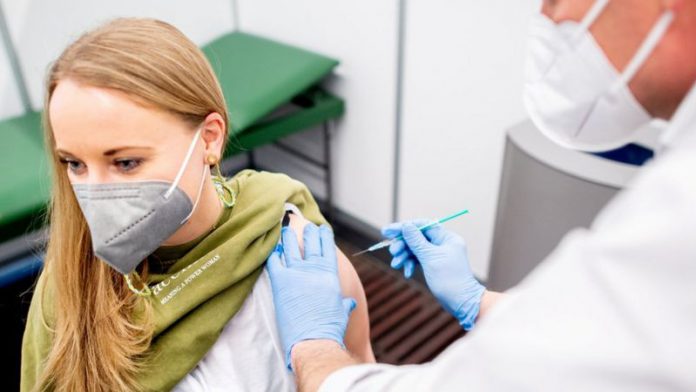The major European Union countries will resume vaccination with the Oxford-AstraZeneca vaccine after the European Medicines Agency (EMA) concluded that it is “safe and effective”.
The European Medicines Agency (EMA) has conducted renewed studies on the vaccine after 13 countries in the European Union suspended its use due to concerns about AstraZeneca’s vaccine that might cause blood clots.
It concluded that the vaccine was “not associated” with an increased risk of stroke.
France, Germany, Spain, and Italy said they would resume using the AstraZeneca vaccine.
It is up to the European Union countries to decide whether they resume use of the AstraZeneca vaccine or even when Sweden said it needed “a few days” to make a decision.
On Thursday, the World Health Organization (WHO) called on countries to continue using the vaccine, and it is scheduled to release the results of its own vaccine safety review.
The agency’s investigation focused on a small number of cases of unusual blood disorders. In particular, it was looking into cases of cerebral venous thrombosis – blood clots in the head.
The decisions to suspend the use of the vaccine have raised concerns about the pace of the vaccination campaign in the region, which has already been affected by the shortage of supplies.
What did the European Medicines Agency say?
“This is a safe and effective vaccine,” said Emer Cooke, the agency’s executive director, in a news conference.
Cooke said that the agency’s panel of experts on drug safety found that “the vaccine is not associated with an increased overall risk of blood clots.”
But she added that the European Medicines Agency could not definitively rule out a link between the vaccine and “a small number of rare, unusual but very serious cases of coagulation disorders.”
Therefore, the committee recommended, she said, to raise awareness of these potential risks, and to ensure that they are included in the product information. Cooke added that additional investigations are underway.
“If it were me, I would get vaccinated tomorrow,” Cooke said. “But I want to know that if anything happens to me after my vaccination, what should I do about it, and that is what we are saying today.”
Welcoming the support for the review of the vaccine as safe and effective, German Minister of Health Jens Spahn added, “Physicians must be informed of the risk of venous thrombosis in women under the age of 55 years, so that they, in turn, can inform patients.”
“Its benefits in protecting people from Covid-19, with the risks associated with death and hospitalization, outweigh the potential risks,” Spahn added.
Why did European countries move?
Thirteen European Union countries have suspended the use of the vaccine, after reports of a small number of cases of blood clots among vaccine recipients in the region.
The major European Union countries said they had chosen to stop using the drug as a “precaution”.
“There have been a few unusual and very disturbing cases that justify this pause and analysis,” French immunologist Alain Fischer, who chairs the government advisory board, told Radio France Inter. “No time wasted.”
And in Germany, the Ministry of Health also indicated that people who were vaccinated had a small number of rare blood clots when justifying its decision. And a summit on the extension of the vaccine rollout was postponed before the agency’s announcement.
Other countries, such as Austria, have stopped using certain batches of the drug, while Belgium, Poland, and the Czech Republic were among the countries that said they would continue to administer the AstraZeneca vaccine.
Decisions to halt the introduction of the AstraZeneca vaccine have been criticized by some politicians and scientists.
What did AstraZeneca say?
The company says there is no evidence of an increased risk of clotting because of the vaccine.
It said it had received 37 reports of blood clots among more than 17 million people vaccinated in the European Union and the United Kingdom since March 8.
AstraZeneca said that these numbers “are much lower than what was expected to occur naturally in the general population of this size and are comparable to other licensed Covid-19 vaccines.”

